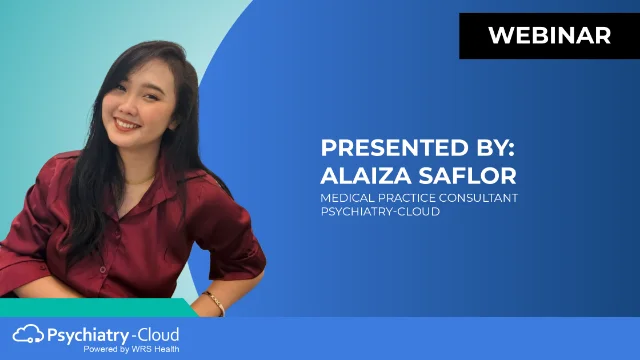Key Takeaways
- Scaling your psychiatry practice should solve problems, not create them, a process rooted in choosing the right healthtech stack.
- Your plan to expand your mental health practice should focus on people, building a team and culture that will grow into the future.
- Operations that establish consistent protocols and complete RCM are critical to success.
- Discover the revenue boost Vitality Psychiatry Group Practice saw after implementing a smarter, automated billing solution.
If you’re thinking about scaling your psychiatry practice, it takes more than hiring clinicians or opening a new location. Growth requires planning, infrastructure, and a strong commitment to clinical quality.
In our webinar, “Scaling Your Psychiatry Practice: Strategies for Growth,” Dr. Mitchell Cabisudo of Vitality Psychiatry Group Practice shared how he grew a single-location private practice into a multi-site behavioral health organization. He drew from real-world experience to outline how to expand your mental health practice, implement modern technologies, and maintain the personalized care your patients expect.
Here are five of the most important takeaways from his presentation—each rooted in real-world strategies that support sustainable growth.
Table of Contents
1. Scaling Is About Solving, Not Just Growing
Dr. Cabisudo opened with a simple but important point: growth alone shouldn’t be the goal. Expansion should solve problems, not create new ones. For his practice, scaling meant alleviating administrative burnout, addressing growing patient demand, and building a care model that didn’t depend on him being in the room 24/7.
When scaling is intentional, it reduces pressure rather than adding to it. The goal is a clear, sustainable care model—not chaotic expansion.
2. Your Tech Stack Isn’t Optional—It’s Core Infrastructure
If you’re wondering how to grow a psychiatry practice, it’s wise to assess your systems, asking, “Do I have the right EHR for my psychiatry practice?” This is especially true if your practice is still using a legacy psychiatry EHR. A modern system of record and connected practice management tools are the backbone of a scalable behavioral health operation. Dr. Cabisudo emphasized that the right systems create freedom: for your team, your patients, and your long-term plans.
He pointed to several ways technology has made a measurable impact on practice operations:
- A centralized, AI-enhanced EHR allows multi-location visibility and remote flexibility
- Claims automation accelerates reimbursements and reduces manual errors
- Integrated telepsychiatry reduces no-shows and expands access to care
- Analytics tools support smarter decision-making
For practices still running on disconnected tools or manual processes, the message was clear: scaling psychiatry practices starts with a systems alignment. You need digital tools that talk to each other, reflect how your team actually works, and evolve with your practice.
“As providers, it’s important to have the right support staff and the right technology that will deal with scheduling and patient phone calls. Anything nonclinical—you want to designate those tasks to your employees and to automation. The less time you spend on admin work, you have more time for patients and for yourself.”
— Dr. Mitchell Cabisudo, Vitality Psychiatry Group Practice
3. Design a People-First Growth Plan
You can’t scale psychiatric care without people. And this statement resonates beyond simply hiring a bigger team. Dr. Cabisudo shared that thoughtful teambuilding, strong onboarding, and staff development were just as important to growth as technology.
That means:
- Hiring clinicians aligned with your philosophy and approach to behavioral health
- Delegating non-clinical work to the right support staff
- Leveraging technology and virtual assistants for repetitive administrative tasks
- Offering professional development and compensation pathways
A scalable model is one where clinicians are supported, administrative burden is shared, and people feel like they are part of something meaningful. Rather than a team of individuals, focus on building an ecosystem that grows together.
Psychiatry-Cloud’s EHR is built for clinicians, with modern tech that scales with your practice.
4. Standardization Is the Unsung Hero of Multi-Site Success
As your practice grows, variation becomes the enemy of quality. Without clear systems in place, successful practices in one location can quietly unravel in another. Dr. Cabisudo emphasized the importance of standardizing care protocols, workflows, training, and the patient experience.
Key strategies included:
- Creating universal treatment guidelines and protocols
- Training new hires on shared clinical and cultural values
- Centralizing patient records and communications across all sites
Standardization doesn’t mean being rigid—it means being repeatable. The more consistent your systems, the easier it is to maintain high-quality care no matter how many locations you’re operating.
5. Revenue Stability as a Financial Strategy
Finally, scaling means tapping into financial planning that goes beyond chasing growth. Dr. Cabisudo spoke about the importance of understanding revenue cycles, managing operational costs, and diversifying income streams.
He also shared how initiatives like subscription-based telepsychiatry or offering online content can create new opportunities without stretching your clinical team thin. The goal isn’t to grow fast—it’s to grow smart, with enough financial insight to sustain your practice long term.
Growth Doesn’t Mean Doing More—It Means Doing Better
Scaling psychiatry practices isn’t a linear checklist—it’s an evolving strategy that balances care, infrastructure, people, and planning. Dr. Cabisudo’s story shows you can expand your mental health practice without compromising patient care, as long as you stay intentional.
Whether you’re at capacity now or starting to consider how to grow a psychiatry practice, the insights from this webinar encourage you to look closely at your workflows, your systems, and your support network. Dr. Cabisudo proves that scaling helps you serve a larger patient population and fine-tune your psychiatry practice operations.











